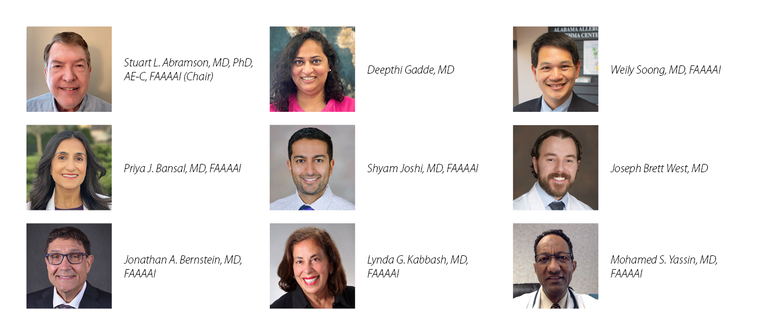


result
President’s Message
President’s Message
Gaining Momentum on Prior Authorization, A/I Training Pipeline and Drug Allergy Initiatives

David A. Khan, MD, FAAAAI
A year as AAAAI President goes by unbelievably fast. Despite that short amount of time, I am proud to share that great progress has been made on the three initiatives I set forth at the start of my presidential term.
Starting a Prior Authorization Task Force
Prior authorization negatively impacts patient care and wellness, is a huge burden for physicians and practice staff, and there has not been a lot of progress on reforms. My first initiative was forming a Prior Authorization Task Force chaired by Stuart L. Abramson, MD, PhD, AE-C, FAAAAI, who also chairs the Advocacy Committee. Joining Dr. Abramson on the Prior Authorization Task Force are myself and the members whose photos you see here.

The Prior Authorization Task Force has been working to: track and advocate for or against legislative measures in Congress that impact the prior authorization process and pertain to patient outcomes and medical practice in our specialty, meet by teleconference with insurance company leaders to convey several specific asks that would improve the prior authorization process, develop an AAAAI position statement on prior authorization, and survey AAAAI members on prior authorization issues and develop a work group report that will address the needs of our members in dealing with these issues.
To achieve these goals, the AAAAI has engaged on several pieces of legislation intended to reform prior authorization with Medicare Advantage plans, paving the way for change in private payer policies. Part of this advocacy included our December 6 Virtual Advocacy Day, during which more than 150 members of the AAAAI registered to interact live with 10 members of Congress. We’ll be continuing our vigorous advocacy in the 118th Congress and through regulatory outreach.
While our teleconference with insurance company leaders is still in the planning stage, contacts have been identified and talking points are in development with four of the largest private payers in the nation. The completed AAAAI position statement on prior authorization recently went out for a vote by the Board of Directors and if approved, will be submitted to an AAAAI journal for publishing and will be posted to the AAAAI website. The survey, which gathered feedback from a mix of members by geographical area and practice setting, found that allergy/immunology is significantly hampered in providing patient care by barriers created by the prior authorization process, and exacerbated by a lack of transparency, inability to access appropriate peer-to-peer review and delays. This is a huge problem the AAAAI can’t solve on its own, but the work of the Prior Authorization Task Force has enhanced the awareness that the AAAAI is helping tackle it and is willing to partner with others to collaborate on potential solutions. The results of the survey as well as a separate workgroup report on overall recommendations from the Prior Authorization Task Force will be published later.
Launching the Regional Outreach on Allergy/Immunology for Residents (ROAR) Program
My second initiative created the Regional Outreach on Allergy/Immunology for Residents (ROAR) Program. ROAR is modeled after the successful Texas Allergy, Asthma and Immunology Society Primary Care Residents’ Conference and was designed to attract more young people to the field and to increase diversity within the specialty.
Three initial sessions were developed in different geographical regions. The first two were held in the fall in Washington, DC, and Chicago, with the third coming up in San Diego in the spring. This recent article features a resident named Flavia Cuestas-Quiroz, MD, who is “even more interested in allergy and immunology” after attending the first ROAR program, and illustrates how early indicators are showing ROAR is already making an impact. A special shout out and big thank you goes to Andrea A. Pappalardo, MD, FAAAAI, Jennifer A. Namazy, MD, FAAAAI, and Sarbjit (Romi) S. Saini, MD, FAAAAI, the chairs of the first three ROAR programs who have made my vision a reality.
Creating a Drug Hypersensitivity Research Grant
There is limited research in the field of drug allergy, particularly in the United States, and unfortunately there is no pharma or patient advocacy organization support. To help address this, the AAAAI established an early to mid-career award that provides $150,000 over two years with a variety of different metrics to measure success.
Fei Li Kuang, MD, PhD
I’d like to congratulate Fei Li Kuang, MD, PhD, from Northwestern University - Chicago Campus, who is the 2023 AAAAI Drug Hypersensitivity Research Grant recipient for her proposal to generate the first high-resolution transcriptomic and immunophenotype data sets of eosinophils in patients with DRESS syndrome! Dr. Kuang is very excited about her research and shared, “We will identify eosinophil phenotypes and transcript signatures, and address whether they normalize upon DRESS treatment and resolution, with the goal of identifying potential targets for novel eosinophil-directed therapies for disease diagnosis and monitoring. These studies will improve our understanding of the role of eosinophils in DRESS, an important and severe drug hypersensitivity condition, and set the stage for future work on its pathophysiology and treatment.” The AAAAI looks forward to seeing what new insights Dr. Kuang’s research will uncover.
We have also engaged in various advocacy efforts over the past year regarding drug allergy, with the AAAAI leading the effort to delabel unverified penicillin allergy, especially through our outreach in honor of National Penicillin Allergy Day that occurs annually on September 28. Drug Allergy: A 2022 Practice Parameter Update was also published in the December 2022 issue of JACI, and includes a strong recommendation to make proactive efforts to delabel reported penicillin allergy. You can hear more about several of the true practice changers from this parameter, as well as other major updates to the field of drug allergy, at the Presidential Plenary: Paradigm Shifts in Drug Allergy, taking place Friday, February 24 at 1:45 pm during the 2023 Annual Meeting in San Antonio.
In even more exciting news, the AAAAI was awarded a $100,000 Council of Medical Specialty Societies Diagnostic Excellence grant, supported by the Gordon and Betty Moore Foundation, that is focused on expanding outreach to increase penicillin allergy delabeling. This will be done through a program called PATIENT, which stands for Penicillin Allergy Testing: Improving & Expanding Needed Treatment. Educational modules will be developed to expand verification testing for penicillin allergy in target populations to improve patient outcomes, reduce healthcare costs and to aid in the fight against antimicrobial resistance. A steering committee has been formed with AAAAI representatives Timothy Chow, Gerald Lee, Allison Ramsey, and Leah Tamburlin as well as Reuben Arasaratnam an infectious disease specialist to help develop and oversee the project.
During the Business Meeting in San Antonio, which is Monday, February 27 from 8:15 to 9:15 am in the plenary hall, I will hopefully pass the final test of my presidency—not dropping the gavel when I hand it to incoming President Jonathan A. Bernstein, MD, FAAAAI. Thank you for the opportunity to serve as your AAAAI President over the last year! It’s been a terrific journey and would not have been possible without the tremendous support I have had from the AAAAI staff and our fabulous Board of Directors. Hope to see you very soon in San Antonio!
Sincerely,
David A. Khan, MD, FAAAAI
AAAAI President
president@aaaai.org





